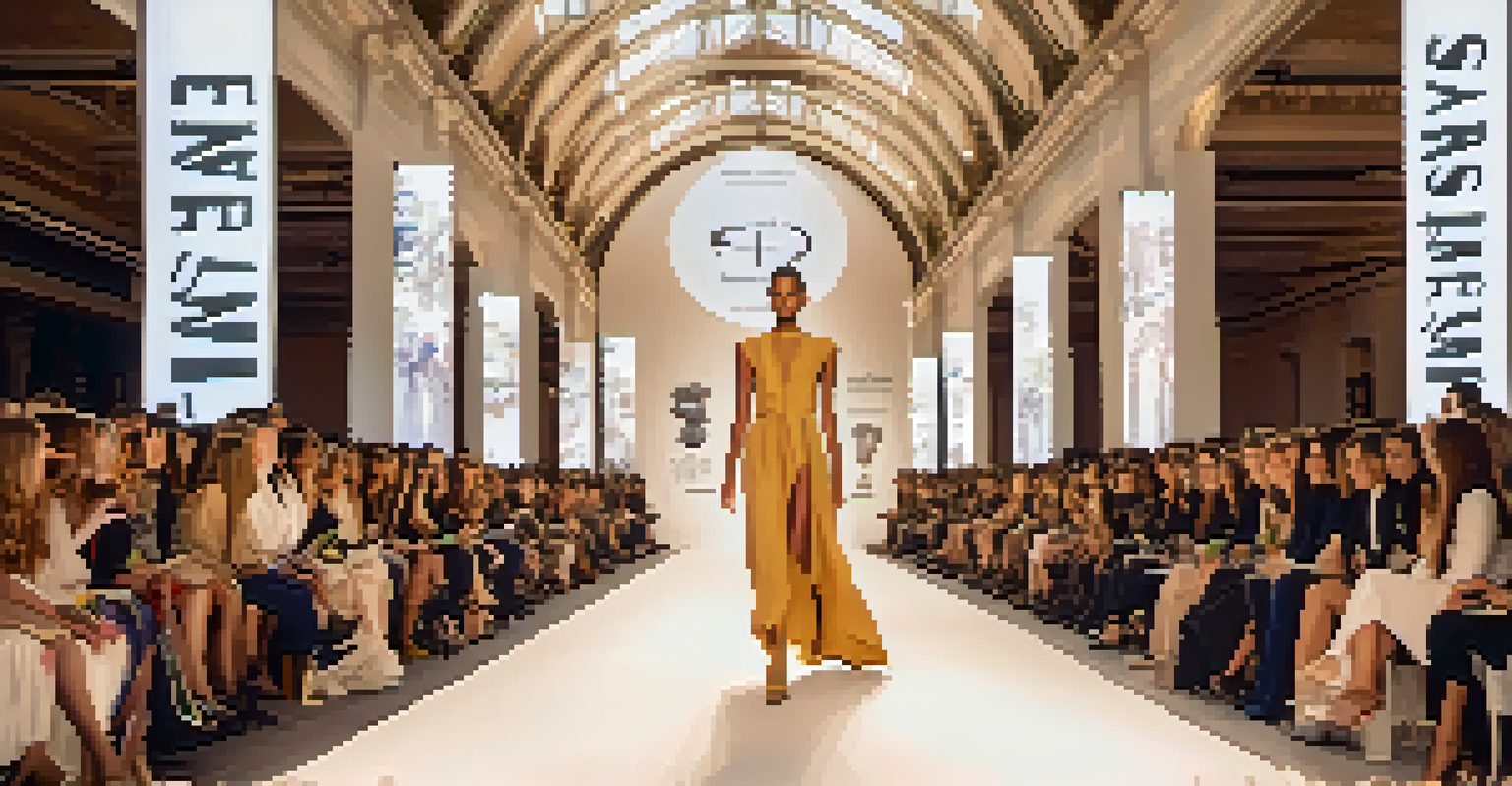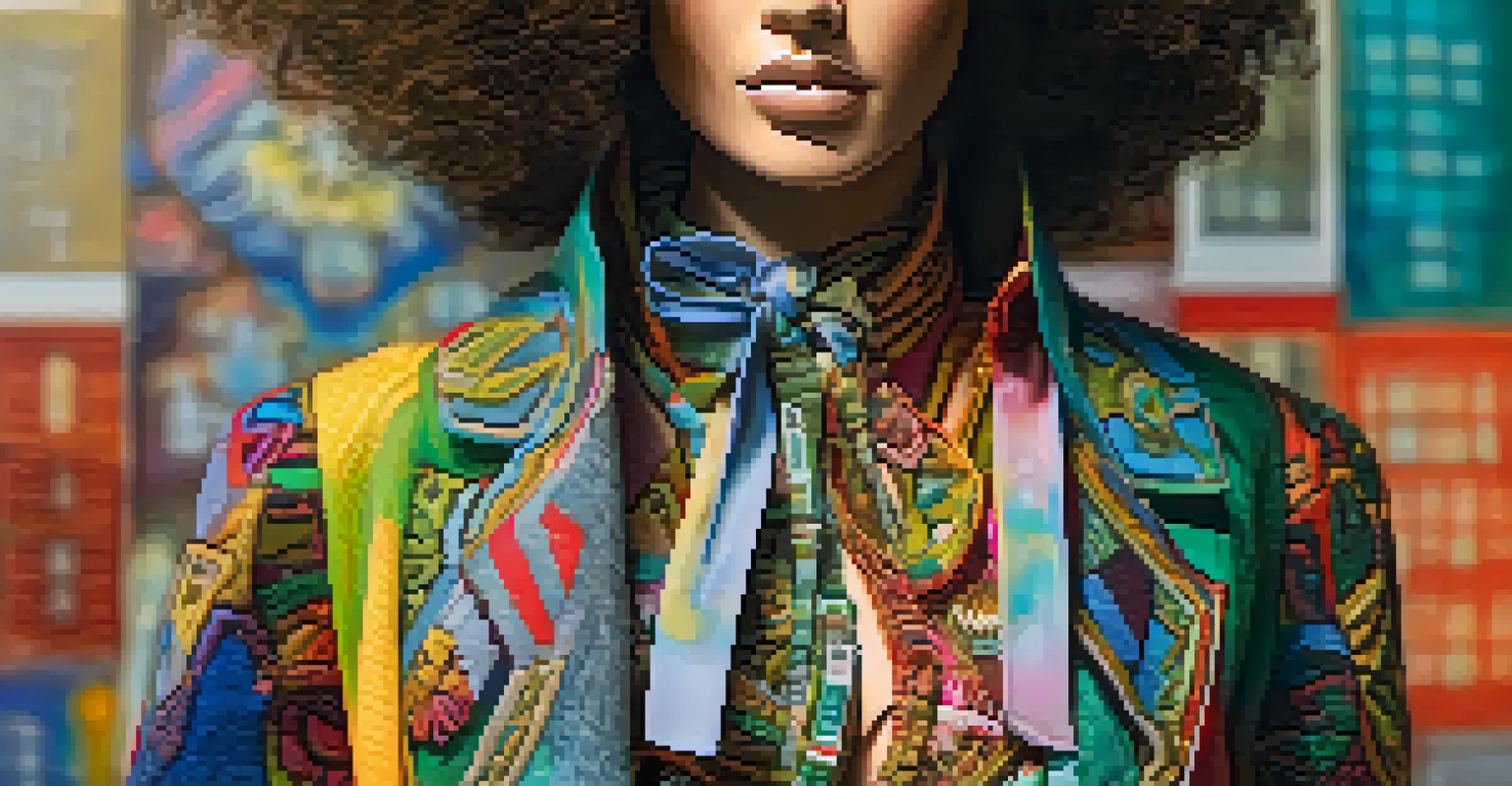Fashion as a Catalyst for Social Change: The Activist's Wardrobe

Understanding Fashion's Role in Social Movements
Fashion is more than just clothing; it's a powerful tool for expression. Throughout history, styles have been used to convey messages, challenge norms, and unite people under common causes. From the suffragette white dresses to the black leather jackets of the punk movement, clothing has often reflected societal shifts and aspirations.
Fashion is the armor to survive the reality of everyday life.
When we look at fashion in the context of social movements, it’s clear that what we wear can speak volumes. For example, the use of specific colors or symbols can instantly indicate solidarity with a cause, creating a visual language that transcends words. This is why many activists choose their outfits carefully, knowing that their wardrobe can amplify their message.
Moreover, fashion has the unique ability to cross cultural and geographical boundaries, making it an effective medium for global movements. As social media amplifies these messages, the impact of a single outfit can be felt worldwide, inspiring others to join the cause or rethink their perspectives on pressing issues.
The Rise of Sustainable Fashion and Activism
Sustainable fashion has emerged as a powerful response to environmental degradation and unethical labor practices. Activists are advocating for transparency in the fashion industry, pushing brands to consider their environmental footprint and the conditions in which their garments are made. This shift is not just about aesthetics; it’s about responsibility and accountability.

Brands like Patagonia and Reformation are leading the way, showing that fashion can be both stylish and sustainable. By prioritizing eco-friendly materials and fair labor practices, they are setting a standard that resonates with conscious consumers. This trend has sparked a broader conversation about the importance of ethical choices in our daily lives, extending beyond just clothing.
Fashion as a Voice for Change
Fashion serves as a powerful medium for social movements, allowing individuals to express solidarity and advocate for important causes through their clothing choices.
As consumers become more aware of the impact of their purchases, they often turn to fashion as a means of activism. Wearing sustainable brands or thrifted clothing can be a statement of values, showcasing a commitment to reducing waste and promoting social justice. This shift in mindset is not just a trend; it's a movement towards a more sustainable future.
Fashion Icons as Activist Role Models
Fashion icons have long served as role models, using their platforms to advocate for change. Celebrities like Emma Watson and Rihanna have championed causes such as gender equality and education through their fashion choices. Their influence extends beyond their wardrobes, inspiring fans to engage with important social issues.
Style is a way to say who you are without having to speak.
For example, when Emma Watson wore a dress made from sustainable materials to the Met Gala, it sent a strong message about the importance of eco-consciousness in fashion. This not only sparked conversations but also motivated other designers to consider sustainable practices. Such acts show how fashion can be leveraged to promote awareness and encourage action.
Moreover, these icons often collaborate with designers to create collections that support charitable causes. This synergy between fashion and activism amplifies their message, allowing consumers to contribute to social change simply through their purchases. The result is a growing movement that celebrates style while advocating for social responsibility.
The Power of Streetwear in Social Justice
Streetwear has evolved from a subculture to a dominant force in the fashion industry, often intertwined with social justice movements. Brands like Supreme and Off-White have used their platforms to highlight injustice and promote activism. This genre of fashion is not just about looking good; it's about making a statement.
Graphics, slogans, and bold designs often convey messages of resistance and empowerment, turning clothing into a canvas for activism. For instance, t-shirts emblazoned with social justice slogans can spark conversations and raise awareness about pressing issues. Wearing such pieces allows individuals to show their support without uttering a single word.
Sustainable Fashion Takes Center Stage
The rise of sustainable fashion reflects a growing consumer demand for ethical practices, pushing brands to prioritize environmental responsibility and social justice.
The accessibility of streetwear also plays a crucial role in its impact. With its roots in urban culture, streetwear connects with diverse communities, fostering solidarity across demographics. As more people adopt this style, the potential for collective action grows, proving that fashion can indeed be a catalyst for change.
Fashion Weeks: Platforms for Activism
Fashion weeks around the world have traditionally showcased the latest trends, but they are increasingly becoming platforms for activism. Designers are using this prestigious stage to spotlight social issues, incorporating themes of equality, sustainability, and justice into their collections. This shift is reshaping how we view fashion, turning it into a vehicle for change.
For example, during New York Fashion Week, designers have used their runways to advocate for causes like gun control and climate change. By integrating powerful messages into their collections, they challenge the industry to look beyond profit and consider its societal impact. This approach not only elevates the conversation but also engages a broader audience.
As these themes gain traction, fashion weeks can influence public opinion and inspire action. Attendees and viewers alike are encouraged to reflect on the messages woven into the fabrics, igniting a dialogue about the role of fashion in addressing global challenges. This evolution demonstrates that fashion can be a powerful medium for activism.
The Role of Digital Influencers in Fashion Activism
In the age of social media, digital influencers have emerged as significant players in the world of fashion activism. With their vast reach, they are able to amplify important messages and inspire their followers to engage with social issues. This new wave of activism is reshaping how we perceive fashion and its role in society.
Influencers often share their personal stories and the causes they support, encouraging their audience to think critically about their fashion choices. For instance, an influencer promoting thrift shopping not only advocates for sustainable practices but also showcases unique styles, making it a trendy choice. This blend of fashion and activism resonates with a generation that values authenticity and purpose.
Influencers Amplifying Activism
Digital influencers play a crucial role in fashion activism by leveraging their platforms to inspire consciousness and promote social issues among their followers.
Moreover, collaborations between influencers and brands can lead to campaigns that raise funds for various causes. By leveraging their platforms for good, influencers can create a ripple effect, encouraging their followers to take action and make conscious decisions. This demonstrates that fashion activism can thrive in the digital space, reaching audiences far beyond traditional media.
The Future of Fashion as a Force for Change
As we look ahead, the intersection of fashion and activism is poised to grow even stronger. With increasing awareness of social and environmental issues, consumers are demanding more from brands. They want transparency, sustainability, and a commitment to social justice, pushing the industry to evolve.
Future designers and brands that prioritize ethical practices and incorporate activism into their core values are likely to resonate with a conscious consumer base. This shift could lead to a fashion landscape where style and substance coexist, allowing for individual expression while promoting collective responsibility.

Ultimately, fashion has the potential to be a powerful catalyst for change, inspiring individuals to become advocates for the causes they care about. By embracing this role, the fashion industry can contribute to a more equitable and sustainable future, proving that what we wear can truly make a difference.